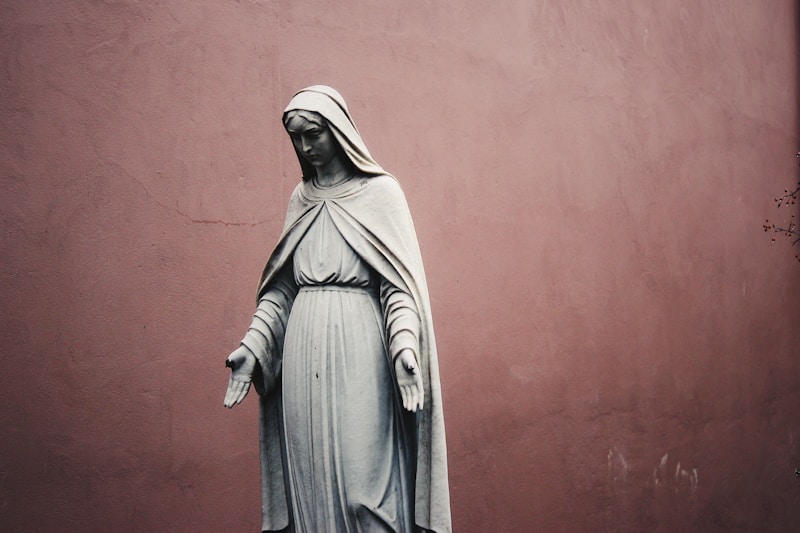9 Questions
What is the meaning of the Greek word heos in Matthew 1:25?
Which of the following is a Catholic dogma regarding Mary?
Which Christian tradition believes in the Dormition of the Theotokos instead of the Assumption?
Which of the following is NOT a title given to Mary in Christian tradition?
Which Protestant reformer stopped celebrating the feast of the Assumption of Mary?
Which of the following is a Marian dogma of the Catholic Church?
Which of the following is a Protestant denomination that continues to honor Mary?
Which of the following is a belief held by Nontrinitarians regarding Mary?
Which council marked the emergence of a specific Marian liturgical system?
Summary
Mary, the Mother of Jesus: Key Facts and Titles
-
Mary was a Jewish woman of Nazareth, the wife of Joseph, and the mother of Jesus.
-
Mary is a central figure of Christianity and is venerated under various titles such as the Blessed Virgin Mary, Saint Mary, and the Mother of God.
-
Mary was chosen by God to conceive Jesus through the Holy Spirit and raised him in Nazareth and was present at his crucifixion and with the apostles after his ascension.
-
Mary's later life is not accounted for in the Bible, but Catholic and Eastern Christian traditions believe that her body was raised into heaven at the end of her earthly life.
-
Mary has been venerated since early Christianity and is considered by millions to be the holiest and greatest saint.
-
The Catholic Church holds distinctive Marian dogmas, namely her Immaculate Conception and her Assumption into heaven.
-
Many Protestants minimize Mary's role, based on what they argue is a lack of biblical support.
-
Mary is mentioned several times in the Quran and has the highest position in Islam among all women.
-
Mary's name in the original manuscripts of the New Testament was based on her original Aramaic name מרים, transliterated as Maryam or Mariam.
-
Mary is commonly referred to as the Virgin Mary, in accordance with the belief that the Holy Spirit impregnated her, thereby conceiving her first-born son Jesus miraculously, without sexual relations with her betrothed/husband Joseph.
-
Mary is also referred to as the Theotokos (primarily in Eastern Christianity), Our Lady, and Queen of Heaven.
-
Mary was present when Jesus worked his first miracle during a wedding at Cana by turning water into wine and was present at his crucifixion and with the apostles after his ascension.The Life and Role of Mary in Christian Tradition
-
Mary is the only person other than the eleven apostles to be mentioned by name who abode in the upper room, when they returned from Mount Olivet.
-
Mary's presence with the apostles during the Pentecost is not explicit, although it has been held as a fact by Christian tradition.
-
Mary's death is not recorded in the scriptures, but Orthodox tradition has her first dying a natural death, known as the Dormition of Mary, and then, soon after, her body itself also being assumed (taken bodily) into Heaven.
-
Belief in the corporeal assumption of Mary is a dogma of the Catholic Church, in the Latin and Eastern Catholic Churches alike, and is believed as well by the Eastern Orthodox Church, the Oriental Orthodox Church, and parts of the Anglican Communion and Continuing Anglican movement.
-
The earliest extant biographical writing on Mary is Life of the Virgin, attributed to the 7th-century saint Maximus the Confessor, which portrays her as a key element of the early Christian Church after the death of Jesus.
-
Catholics have more theological doctrines and teachings that relate to Mary, but they have more feasts, prayers, devotional and venerative practices than any other group.
-
The Catholic Church teaches that Mary is not considered divine and prayers to her are not answered by her, but rather by God through her intercession.
-
The four Catholic dogmas regarding Mary are: her status as Theotokos, or Mother of God; her perpetual virginity; the Immaculate Conception; and her bodily Assumption into Heaven.
-
The Orthodox believe that Mary was and remained a virgin before and after Christ's birth and celebrate the Dormition of the Theotokos, rather than Assumption.
-
Protestants in general reject the veneration and invocation of the Saints.
-
Some early Protestants venerated Mary, but as of 1532, Luther stopped celebrating the feast of the Assumption of Mary and also discontinued his support of the Immaculate Conception.
-
John Calvin remarked, "It cannot be denied that God in choosing and destining Mary to be the Mother of his Son, granted her the highest honor." However, Calvin firmly rejected the notion that Mary can intercede between Christ and man.
-
The idea of respect and high honor for Mary is present in Christian tradition, but the extent of veneration and doctrine surrounding her varies greatly among different denominations.Views on Mary in Various Religions and Denominations
-
The Protestant Reformation led to a decrease in Protestant interest in Mary, but Anglicans and Lutherans continued to honor her.
-
Anglicans recognize Mary's special position in salvation as "God-bearer" and celebrate various feast days in her honor.
-
Lutherans believe in Mary's perpetual virginity and motherhood of God, but criticize the veneration of Mary as idolatry.
-
Methodists accept the doctrine of the virgin birth but reject the doctrine of the Immaculate Conception.
-
Nontrinitarians acknowledge Mary as the biological mother of Jesus but reject the doctrine of the Immaculate Conception and do not recognize Marian titles.
-
Mary holds a singularly exalted place in Islam, and the Quran recounts the Divine Promise given to Mary and her role as the mother of Jesus.
-
The Bahá'í Faith venerates Mary as the mother of Jesus and confesses the Immaculacy of the Virgin Mary.
-
Biblical scholars debate the meaning of the statement in Matthew 1:25 that Joseph did not have sexual relations with Mary before she gave birth to Jesus.Devotion to Mary in Christianity
-
Scholars have debated whether Mary remained a virgin or not, and the Greek word heos in Matthew 1:25 has been interpreted differently.
-
The pagan philosopher Celsus in the 2nd century claimed that Jesus was the illegitimate son of a Roman soldier, while the church father Origen dismissed this as a fabrication.
-
Justin Martyr and Ireneaus drew parallels between Mary and Eve, and the Gospel of James was written in the 2nd century with a focus on Mary.
-
The veneration of Mary began in the 3rd century in Egypt and the earliest known Marian prayer is from this time as well.
-
The Council of Ephesus in 431 marked the emergence of a specific Marian liturgical system, and larger churches were dedicated to Mary from the 5th century.
-
The Byzantine Empire venerated Mary as the virginal Mother of God and intercessor, and Queen Theodora furthered the cult of Mary in the 6th century.
-
The Middle Ages saw many legends about Mary, and her popularity increased dramatically from the 12th century.
-
Over time, devotion to Mary has varied greatly among Christian traditions, with Roman Catholics and Orthodox showing more attention to Marian prayers or devotions.
-
Feasts relating to Mary grew out of the cycle of feasts celebrating the Nativity of Jesus, and there are more titles, feasts, and venerative practices among Roman Catholics than any other Christian tradition.
-
The veneration of Marian relics used to be common practice before the Reformation, and bodily relics have been limited to hair, nails, and breast milk.
-
Places believed to be associated with Mary include the House of the Virgin Mary in Ephesus and the Tomb of the Virgin Mary in Jerusalem.
-
Mary is traditionally portrayed in blue in paintings, a tradition that originated in the Byzantine Empire.
Description
How much do you know about Mary, the mother of Jesus? Test your knowledge with our quiz on key facts and titles related to Mary. From her role in Christianity to her veneration across different religions and denominations, this quiz covers a range of topics surrounding one of the most important figures in the Christian faith. Challenge yourself and learn more about the life and role of Mary in Christian tradition, as well as her significance in various religious beliefs.


